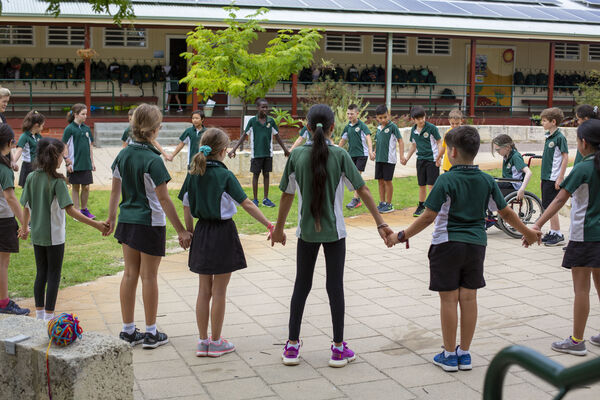Overview
Alignment with Be You Domains
-
Mentally Healthy Communities
-
Learning Resilience
-
Early Support
-
Responding Together
Alignment with Australian Curriculum
- Health and PE
- Humanities and Social Sciences
- The Arts
Target audience
- Primary school
- Secondary school
Target groups
- Small group
- Whole class
Aims
Through rhythmic movement, small steps BIG MOVES supports children and young people to develop mental and physical health skills. The curriculum-based program for years 5 and 6 focuses on transitions and aims to prepare children for the challenges of high school. The program for years 7 and 8 aims to foster interpersonal skills and improve physical and mental health.Program theory
Facilitating community workshops and school programs since 2020, Yatimba! found that children can often face significant challenges when transitioning from primary to secondary education. This transition can lead to increased anxiety, lowered self-esteem, reduced engagement and motivation and impaired academic performance. In response to these findings, Yatimba! designed an inclusive program that provides comprehensive and targeted support. By creating a supportive, energetic, and cheerful learning environment, the small steps BIG MOVES program allows children and young people to explore and apply self-regulation, communication, and teamwork skills within the broader framework of the NSW Curriculum.Topics
Transitioning from primary to high school, healthy habits, bullying and stereotyping, building relationships, community service and physical activities.Cost
Program structure
The program is best delivered over a term. It includes 10 lessons (1 hour and 50 minutes) to be run weekly.Instructor
- External facilitator
- Educator
- Wellbeing leader
Instructor training
Facilitator is provided by Yatimba!Supporting resources or materials available with program
- None
Ongoing support
Facilitators are trained every 3 months.Parent involvement
- Follow-up information provided after program
- Homework
Origin of program
Australia
Yatimba!
Program authors
Sheron Sultan
Ratings
Summary of evidence factors
This is a summary of the evaluation or research study characteristics that contribute to the program’s evidence rating.
|
Positive impact on at least one outcome for children and/or young people?
The study reported positive outcomes. |
Yes |
|---|---|
|
Link between program description and theory of change
Theory of change refers to whether there was a comprehensive description and illustration of how and why a desired change is expected to happen in a particular context. |
Comprehensive |
|
Study design
Type of study design reported. |
Qualitative/Post cohort |
|
Independence
The degree to which the program authors were involved in the research. |
None |
Summary of implementation factors
This is a summary of the program’s characteristics that contribute to its implementation rating.
|
Feedback sought from participants
Participants enjoyed the program and understood its benefits. |
Yes |
|---|---|
|
Feedback sought from instructors
Instructors enjoyed the program and understood its benefits. |
Yes |
|
Groups program is not suitable for
Groups the program wouldn't be suitable for or that required further research to determine suitability. |
Not assessed |
|
Training provided during study
The model of training provided. |
Face to face, all instructors, in person |
|
Ongoing instructor support provided during study
Whether ongoing support is provided. |
Yes |
Context
This is a summary of the context in which the evidence for the program was established.
|
Study Participants
Pre school, primary school (Foundation to Year 6), secondary school (Years 7 to 12). |
Secondary school |
|---|---|
|
Country of Study/s
The location in which the evidence or research was conducted. |
Australia |
|
Location of Study/s in Australia
The state (or states) the program was assessed in Australia. |
NSW |
|
Evaluation of program in culturally and linguistically diverse populations
Provider has included culturally and linguistically diverse people when assessing the program. |
No |
|
Evaluation of program in Aboriginal and Torres Strait Islander children and young people
Provider has included Aboriginal and Torres Strait Islander peoples when assessing the program. |
No |
|
Evaluation of program in low socioeconomic groups
Program has evaluated a diverse socio-economic population in their research. |
No |
|
Developmental based adaptations to program design and delivery
Shorter sessions for younger students or activities are adjusted for age appropriateness. |
No |
|
Evaluation of program in children and young people with disability and/or learning difference
Provider has included participants with a disability or learning difference when assessing the program. |
No |
Last updated: 14 October 2024
